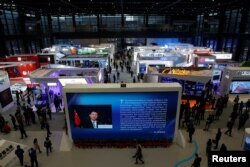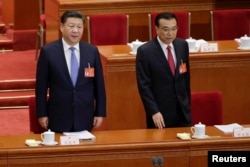A ranking member of China’s top political advisory body has put forward a proposal that urges authorities to adopt a more open approach toward internet censorship. But just as news of the proposal began to spread in China, the country’s internet minders moved in to tamp down any discussion, blocking access to the proposal and stories about its content online.
China claims it has the world’s largest internet population and takes pride in being No. 1, but it is also a global leader in censorship, blocking everything from access to foreign websites to comment on social media. The U.S.-based Freedom House has described China as the “world’s worst abuser of internet freedom.”
And with such a wide cyber dragnet, all kinds of resources, from scientific to scholarly and online news portals, are blocked. Access to websites overseas is also painfully slow.
Negative list
And that is something that Luo Fuhe, vice chairman of the Chinese People’s Political Consultative Conference, and others attending the Twin Sessions, meetings of the CPPCC and China’s National People’s Congress, said should change.
In his “Proposal to Improve and Increase Speed and Access to Foreign Websites,” Luo said the bandwidth speed for China’s international gateways is still only a fraction of what the world’s per capita bandwidth speed is and half that of Africa’s.
Now, much of the focus of building up networks has been on mobile terminals, as more than 900 million of China’s 946 million internet users access the web through their cellphones, the proposal notes.
And that is “making computer network speed improvement a challenge.”
His proposal adds that while blocking of websites to keep out propaganda sites of hostile forces and terrorist groups as well as other illegal activities is understandable, the inability to access to websites for research education and news can have an impact on timely research
China’s leaders appear to agree with Luo’s proposals regarding internet speeds. In his annual work report, Premier Li Keqiang noted that “faster and more cost-effective information networks are crucial to development in every sector.”
Negative list
Speaking with VOA recently on the sidelines of political meetings in Beijing, Luo said China has gotten to the point where it can begin to cut back on censorship and blocking of non-sensitive content.
“The great majority of websites involve, for example, natural science, ordinary life in society, and many other aspects — this is by far the majority. I should say, we think, in order to increase speed, supervision can use more 'scientific' methods,” Luo said.
Luo suggests that China should instead implement a negative list for the internet. He said that for the negative list there would be sites that are completely off limits, and those that are accessible but need checking from time to time.
Silenced and support
Foreign business groups have long complained about internet access speeds and the hindrance censorship poses to business and technology exchanges in China. Companies list a host of problems from difficulties protecting property rights and implementing digitization in manufacturing to more simple issues, such as communicating with families and colleagues overseas.
But shortly after Luo’s proposal started making news in China, authorities rushed in and began censoring any information about it online.
According to China Digital Times, which routinely publicizes censorship orders from China, websites have been ordered to delete all posts and reports on Luo’s proposal.
Authorities have also stepped in to silence comments on social media websites, but some were still getting through.
Few of the delegates VOA spoke to on the sidelines of the meetings were aware of the proposal.
Zhu Hongmin, a representative to the CPPCC, said he has trouble visiting websites at times and that it’s reasonable to want more access to overseas websites. Zhu had not heard of the proposal, but said he would support it, if indeed there was such a proposal.
Chen Zhongyi, another CPPCC member said: “Yeah, that’s definitely good. Globalization you know, everybody needs to communicate.”
Anthony Wu, a CPPCC standing committee member also liked the proposal.
One user on Guancha.cn, a party friendly, nationalistic news and opinion aggregator website said: “If you’ll pardon me for speaking freely, continuing to seal off the internet now is a policy that goes against the Three Self-Confidences”— a reference Chinese President Xi Jinping’s policy that aims to build faith in China’s political system and ideology.
CPPCC meetings concluded on Monday. The political advisory body said 4,156 proposals were accepted and 920 proposals were sent for consideration to government departments.
It was unclear whether Luo’s proposal was moving forward and VOA was unable to reach him for further comment on the status of his bill or the backlash of censorship it has met online.
Feng Yibing also contributed reporting for this story.






